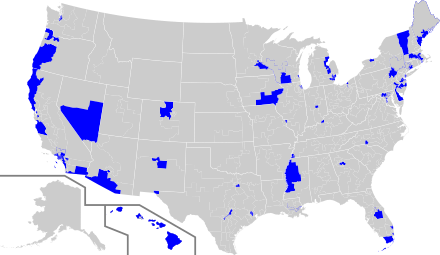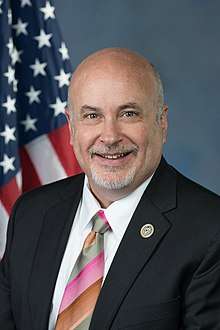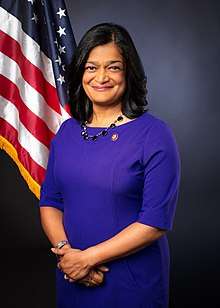Congressional Progressive Caucus
The Congressional Progressive Caucus (CPC) is a congressional caucus affiliated with the Democratic Party in the United States Congress.[5] The CPC represents the most left-leaning, progressive faction of the Democratic Party.[6][7] It was founded in 1991 and has generally grown since then.
Congressional Progressive Caucus | |
|---|---|
 | |
| Co-Chairs | Mark Pocan Pramila Jayapal |
| First Vice Chair | Ro Khanna |
| Whip | Ilhan Omar |
| Vice Chairs | Sheila Jackson Lee, Joe Neguse, Veronica Escobar, Ruben Gallego, Mark Takano, Debbie Dingell, David Cicilline, Donald Norcross, Jan Schakowsky |
| Founded | 1991 |
| Ideology | Progressivism[1] Modern liberalism[2] Social democracy[3] |
| Political position | Left-wing[4] |
| National affiliation | Democratic Party |
| Colors | Blue |
| Seats in the Senate | 1 / 100
|
| Seats in House Democratic Caucus | 95 / 233
|
| Seats in the House | 95 / 435
|
| Website | |
| cpc-grijalva | |
| |
Midway through the 116th United States Congress, the CPC had 97 members, making it the second largest ideological caucus in the Democratic Party and the third largest ideological caucus overall. The CPC is co-chaired by U.S. Representatives Mark Pocan (D-WI) and Pramila Jayapal (D-WA).
History
The CPC was established in 1991 by U.S. Representatives Ron Dellums (D-CA), Lane Evans (D-IL), Thomas Andrews (D-ME), Peter DeFazio (D-OR), Maxine Waters (D-CA) and Bernie Sanders (I-VT). Additional Representatives joined soon thereafter, including Major Owens (D-NY), Nydia Velázquez (D-NY), David Bonior (D-MI), Bob Filner (D-CA), Barney Frank (D-MA), Maurice Hinchey (D-NY), Jim McDermott (D-WA), Jerry Nadler (D-NY), Patsy Mink (D-HI), George Miller (D-CA), Pete Stark (D-CA), John Olver (D-MA), Lynn Woolsey (D-CA) and Nancy Pelosi (D-CA). Sanders was the first CPC Chairman.[8]
The founding CPC members were concerned about the economic hardship imposed by the deepening recession and the growing inequality brought about by the timidity of the Democratic Party response in the early 1990s. On January 3, 1995, at a standing room only news conference on Capitol Hill, they were the first group inside Congress to chart a comprehensive legislative alternative to U.S. Speaker Newt Gingrich and the Republican Contract with America. The CPC's ambitious agenda was framed as "The Progressive Promise: Fairness."[9]
Budget proposal for 2012
In April 2011, the Congressional Progressive Caucus released a proposed "People's Budget" for fiscal year 2012.[10] Two of its proponents stated: "By implementing a fair tax code, by building a resilient American economy, and by bringing our troops home, we achieve a budget surplus of over $30 billion by 2021 and we end up with a debt that is less than 65% of our GDP. This is what sustainability looks like".[11]
Electoral results
Ideology
The CPC advocates "universal access to affordable, high quality healthcare" (universal healthcare or single-payer healthcare), fair trade agreements, living wage laws, the right of all workers to organize into labor unions and engage in collective bargaining, ending certain provisions of the Patriot Act, U.S. participation in international treaties, responsible reductions in military expenditure, strict campaign finance reform laws, a crackdown on corporate influence and protection of Social Security benefits.[12]
List of Chairs
| Term start | Term end | Chair(s) | |
|---|---|---|---|
| 1991 | 1999 | Rep. Bernie Sanders (VT) | |
| 1999 | 2003 | Rep. Dennis Kucinich (OH) | |
| 2003 | 2005 | Rep. Peter DeFazio (OR) | |
| 2005 | 2009 | Rep. Barbara Lee (CA) | Rep. Lynn Woolsey (CA) |
| 2009 | 2011 | Rep. Raúl Grijalva (AZ) | |
| 2011 | 2017 | Rep. Keith Ellison (MN) | |
| 2017 | 2019 | Rep. Mark Pocan (WI) | |
| 2019 | present | Rep. Pramila Jayapal (WA) | |
Membership
All members are Democrats or caucus with the Democratic Party. In the 116th Congress, there are 97 declared Progressives, including 95 voting Representatives, one non-voting Delegate and one Senator.[13]
House members
 Congressional Progressive Caucus from the United States House of Representatives in the 116th United States Congress |
 Chairman Mark Pocan |
 Chairwoman Pramila Jayapal |
|
Non-voting
|
Senate members
- Bernie Sanders (I-Vermont)
Former members
- Thomas Andrews (ME-1) – defeated in run for Senate in 1994
- Tammy Baldwin (WI-2) – elected to Senate in 2012
- Bob Brady (PA-1) – left caucus
- Sherrod Brown (OH-13) – elected to Senate in 2006
- Roland Burris (IL Senate) – retired from Congress
- Mike Capuano (MA-7) – defeated for re-nomination by current caucus member Ayanna Pressley in 2018
- Julia Carson (IN-7) – died in 2007
- Donna M. Christensen (Virgin Islands) – retired from Congress
- Hansen Clarke (MI-13) – defeated for re-nomination in 2012
- Emanuel Cleaver (MO-5) – left caucus
- John Conyers (MI-13) – resigned in 2017
- Elijah Cummings (MD-7) – died in 2019
- Donna Edwards (MD-4) – defeated in run for Senate in 2016
- Keith Ellison (MN-5) – elected Attorney General of Minnesota in 2018
- Lane Evans (IL-17) – retired from Congress
- Chaka Fattah (PA-02) – defeated for re-nomination in 2016 by current caucus member Dwight Evans
- Russ Feingold (WI Senate) – defeated for re-election in 2010
- Bob Filner (CA-51) – retired from Congress
- Barney Frank (MA-4) – retired from Congress
- Alan Grayson[14] (FL-8) (FL-9) – defeated in run for Senate in 2016
- Luis Gutierrez (IL-4) – retired from Congress
- John Hall (NY-19) – defeated for re-election in 2010
- Phil Hare (IL-17) – defeated for re-election in 2010
- Katie Hill (CA-25) – resigned in 2019
- Maurice Hinchey (NY-22) – retired from Congress
- Mazie Hirono (HI-2) – elected to Senate in 2012
- Mike Honda (CA-17) – defeated for re-election in 2016 by current caucus member Ro Khanna
- Rush Holt (NJ-12) – retired from Congress
- Jesse Jackson, Jr. (IL-2) – resigned in 2012
- Ruben Kihuen (NV-4) – retired from Congress
- Carolyn Cheeks Kilpatrick (MI-13) – defeated for re-nomination in 2010
- Dennis Kucinich (OH-10) – defeated for re-nomination in 2012
- John Lewis (GA-05) - died in 2020
- Ed Markey (MA-5) – elected to Senate in 2013
- Eric Massa (NY-29) – resigned in 2010
- Cynthia McKinney (GA-4) – defeated for re-nomination in 2008 by current caucus member Hank Johnson
- Brad Miller (NC-13) – retired from Congress
- George Miller (CA-11) – retired from Congress
- Jim Moran (VA-8) – retired from Congress
- Rick Nolan (MN-8) – retired from Congress
- John Olver (MA-1) – retired from Congress
- Major Owens (NY-11) – retired from Congress
- Ed Pastor (AZ-7) – retired from Congress
- Nancy Pelosi (CA-8) – left caucus when elected House Minority Leader
- Jared Polis (CO-2) – elected Governor of Colorado in 2018
- Carol Shea-Porter (NH-1) – retired from Congress
- Laura Richardson (CA-37) – defeated for re-election in 2012
- Bobby Rush (IL-1) – left caucus
- Louise Slaughter (NY-25) – died in 2018
- Hilda Solis (CA-32) – became Secretary of Labor in 2009
- Pete Stark (CA-13) – defeated for re-election in 2012
- John Tierney (MA-6) – defeated for re-nomination in 2014
- Stephanie Tubbs Jones (OH-11) – died in 2008
- Henry Waxman (CA-33) – retired from Congress
- Paul Wellstone (MN Senate) – died in 2002
- Robert Wexler (FL-19) – resigned in 2010
- Lynn Woolsey (CA-6) – retired from Congress
See also
References
- "What is CPC?". Retrieved July 23, 2014.
- "Ellison Offers Progressive View Of Debt Deal". NPR. August 1, 2011. Retrieved March 29, 2017.
Congressional Progressive Caucus — the liberal wing of the Democratic Party in the House
- Raza, Syed Ali (2012), Social Democratic System, Global Peace Trust, p. 91
- Cunningham, Vinson (February 19, 2017). "Will Keith Ellison Move the Democrats Left?". The New Yorker. Condé Nast. Retrieved March 14, 2018.
- "Congressional Progressive Caucus: Caucus Members". house.gov.
- Hardisty, Jean (2000). Mobilizing Resentment: Conservative Resurgence From The John Birch Society To The Promise Keepers. Boston, MA.: Beacon Press. p. 221. ISBN 978-0807043172.
- "Two congressmen endorse Carl Sciortino in race to replace Markey in Congress". Boston.com. September 13, 2013. Retrieved July 23, 2014. "[T]he Congressional Progressive Caucus, the umbrella group for left-leaning Democratic members of Congress".
- Talbot, Margaret. "The Populist Prophet". The New Yorker. Retrieved 19 May 2020.
- Brodey, Sam. "How Keith Ellison made the Congressional Progressive Caucus into a political force that matters". MinnPost. Retrieved 19 May 2020.
- "The People's Budget" (PDF). Congressional Progressive Caucus. Retrieved April 24, 2011.
- Honda, Michael; Grijalva, Raul (April 11, 2011), "The only real Democratic budget", The Hill, retrieved March 24, 2018
- "The Progressive Promise". Congressional Progressive Caucus. Retrieved September 28, 2018.
- "Congressional Progressive Caucus: Caucus Members". cpc-grijalva
.house (Retrieved:February 23, 2019).gov /caucus-members / - "Congressional Progressive Caucus".